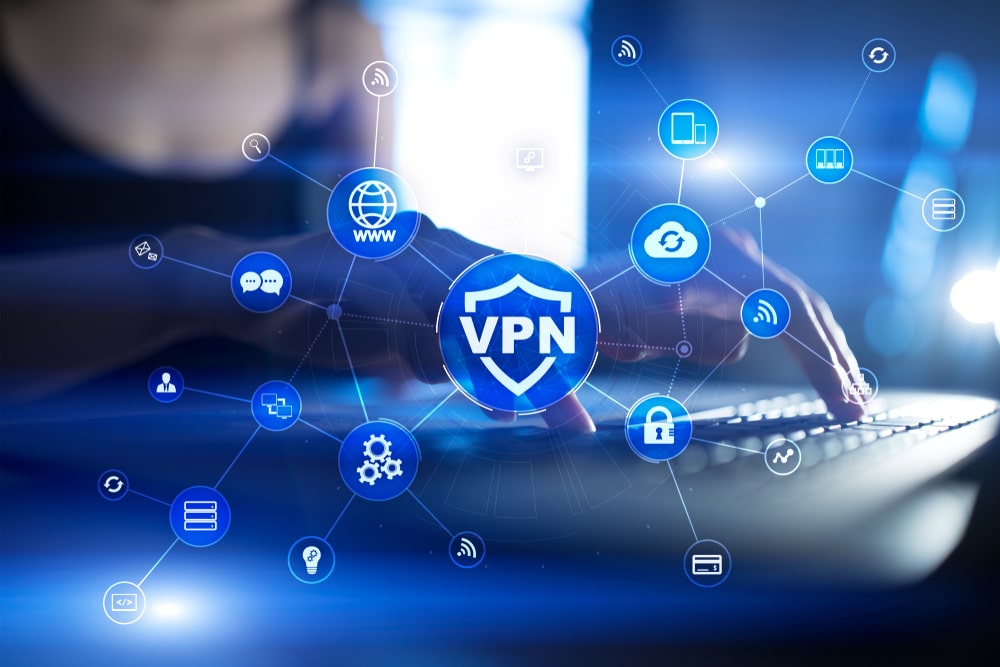In the IoT industry security has always been a trending topic, a Virtual Private Network (VPN) can be an invaluable tool. But with so much misinformation about how VPNs work and what they do, it can feel overwhelming trying to figure out if one is right for you. This post will explain the basics of VPNs and why connecting your Internet of Things (IoT) devices through one is essential for protecting data. In this article we will take a closer look at what a Virtual Private Network is and help you to determine if that’s the right solution for your IoT Project.
What is a Virtual Private Network?
The term VPN is short for Virtual Private Network, it connects a central server to your device privately through the internet so that users can send and receive data to their devices without being directly connected to the public internet. VPNs are a good alternative way to connect to the internet instead of using a public Wi-Fi networks, as it adds an extra layer of protection against potential hackers who may be lurking on the network, to ensure data packets are kept private.
A VPN tunnel is created when a site-to-site connection is established from a server or datacentre to an end SIM card or device. Each device is given a fixed IP address, which is the unique number that identifies its location on the network, so that the server knows exactly how to always connect to the required device.
Potential risks of not using a VPN on IoT devices?
As we continue to expand our use of IoT devices, it’s crucial to recognize the potential risks of not using a VPN. These devices are constantly collecting sensitive information about our daily lives, from our daily routines to our personal preferences. Without the protection of a VPN, this information is susceptible to hackers and cybercriminals who can use it for malicious purposes such as identity theft and fraud. Additionally, not using a VPN can leave your devices vulnerable to malware and other cybersecurity threats. Investing in a reliable VPN is therefore essential to safeguard your privacy and security in the ever-evolving technological landscape.
Why do you need a VPN?
IoT projects deal with a lot of sensitive information that could be harmful if it falls into the wrong hands. Even a small data breach could give a hacker access to a lot of valuable information about your company. Without a VPN, data is sent over the public internet and is vulnerable to cyber-attacks such as sniffing, which involves an attacker listening in on interactions between two parties.
Security should always be a concern when working on any IoT project. One of the most popular solutions is to use is a VPN. Private networks allow businesses to adopt the levels of security that they require. If a hacker gained access to your data connection, deciphering its contents would be very difficult because encryption is an excellent tool for ensuring the integrity and confidentiality of your data. This makes VPN’s very attractive for IoT companies handling important data. Finally, a VPN safeguards against unsolicited connections from other people attempting to connect to the IoT device. Only SIMs that have the VPN connection enabled can connect to the specific network.
While a VPN isn’t required for all IoT use cases, it should be taken into consideration if you need any kind of security. A growing number of IoT projects are including VPN’s like Secure Vehicle Tracking for Major Logistics Company Europe use a cellular connection through a VPN to monitor and control their cargo.
Recommended way to secure your network
Our most popular solutions are built with an Internet Protocol Security (IPSec) site-to-site or with an OpenVPN connection. However a VPN by itself does not constitute a comprehensive security system. Another important security measure to think about as part of a complete solution is implementing a firewall to filter undesired Internet traffic – this way the fixed static IP only enables two-way communication between the IoT device and the servers of the customer organisation. In other words, it enables remote access only to the correct ports of the IoT device, allowing users to retrieve data whenever they need it.
Ritesim believes that businesses should entrust their assets to their own specialised Virtual Private Network to combat this. We create this for our partners, linking them directly from our datacentre to the key hub site. By assigning each SIM card a static private IP address and adding the protection of our firewall, we enable clients to access only the whitelisted devices and internet services that they require.
If you have any questions regarding security, VPN infrastructure or anything IoT please contact us below and we will be in touch shortly!



